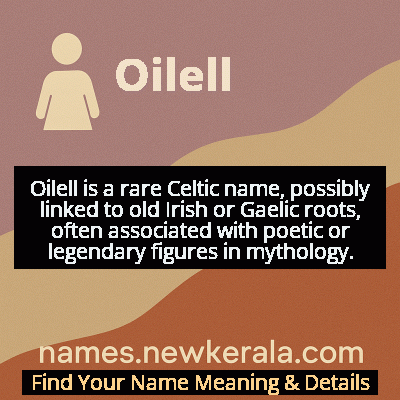Oilell Name Meaning & Details
Origin, Popularity, Numerology Analysis & Name Meaning of Oilell
Discover the origin, meaning, and cultural significance of the name OILELL. Delve into its historical roots and explore the lasting impact it has had on communities and traditions.
Name
Oilell
Gender
Female
Origin
Celtic
Lucky Number
2
Meaning of the Name - Oilell
Oilell is a rare Celtic name, possibly linked to old Irish or Gaelic roots, often associated with poetic or legendary figures in mythology.
Oilell - Complete Numerology Analysis
Your Numerology Number
Based on Pythagorean Numerology System
Ruling Planet
Moon
Positive Nature
Diplomatic, friendly, artistic, empathetic.
Negative Traits
Over-sensitive, moody, indecisive, prone to self-pity.
Lucky Colours
Green, cream, white.
Lucky Days
Monday.
Lucky Stones
Pearl, moonstone.
Harmony Numbers
1, 3, 4.
Best Suited Professions
Diplomats, mediators, caregivers, artists.
What People Like About You
Cooperative spirit, friendliness, artistic talent.
Famous People Named Oilell
Oilell of Ulster
Mythical Queen
Legendary ruler featured in the Ulster Cycle, known for her diplomatic skills in uniting warring clans
Oilell the Wise
Mythological Figure
Celtic seer and advisor to kings, credited with establishing early legal systems in pre-Christian Ireland
Oilell of the Silver Hand
Legendary Queen
Renowned for her healing abilities and establishing the first healing sanctuaries in Celtic Britain
Name Variations & International Equivalents
Click on blue names to explore their detailed meanings. Gray names with will be available soon.
Cultural & Historical Significance
The name's association with royal figures reflects the Celtic reverence for strong female leadership and the important role women played in political and spiritual matters. Historical records suggest that variations of Oilell were used by aristocratic families in early medieval Ireland and Scotland, particularly among clans claiming descent from mythological ancestors. The name's persistence in oral traditions and medieval manuscripts demonstrates its enduring cultural importance, serving as a bridge between Ireland's pagan past and Christian medieval period. Oilell represents the ideal of feminine power that is both nurturing and authoritative, a concept central to Celtic cosmology where goddesses often held equal or greater power than gods.
Extended Personality Analysis
Individuals named Oilell are typically associated with strong leadership qualities, deep intuition, and natural grace. They often possess a commanding presence combined with empathetic understanding, making them effective mediators and community leaders. The mythological associations suggest traits of wisdom beyond years, strategic thinking, and the ability to see patterns others might miss. Oilells are often described as having a radiant personality that draws people to them, much like the name's meaning of 'beauty' or 'radiance.'
They tend to be protective of those they care about, with a strong sense of justice and fairness. Their decision-making is typically balanced between logical analysis and intuitive knowing, making them trusted advisors. The name carries connotations of resilience and inner strength, with an ability to maintain poise under pressure. Many with this name display creative talents, particularly in storytelling, music, or visual arts, reflecting the Celtic tradition of bardic skills. These individuals often feel a deep connection to nature and heritage, and may demonstrate unusual sensitivity to their environments. Their leadership style tends to be inclusive and consensus-building rather than authoritarian, reflecting the Celtic tribal council traditions where queens often served as arbiters and peacemakers.
Modern Usage & Popularity
In contemporary times, Oilell remains a rare but cherished name, primarily used by families with Celtic heritage or those drawn to mythological names. While not appearing on mainstream popularity charts, it has seen a gradual increase in usage since the 1990s Celtic revival movement. The name is particularly popular in Ireland, Scotland, and among diaspora communities in North America and Australia. Modern parents choosing Oilell often seek unique names with deep cultural roots and strong feminine energy. The name appeals to those interested in pagan or neo-Celtic spiritual traditions, as well as fantasy literature enthusiasts. Recent years have shown a slight uptick in usage, possibly influenced by the trend toward vintage and mythological names. It's considered a sophisticated choice that stands out without being overly exotic, maintaining its Celtic authenticity while being accessible to English speakers. The name's rarity makes it distinctive, yet its mythological background gives it substantial weight and cultural resonance for parents seeking meaningful names.
Symbolic & Spiritual Meanings
Symbolically, Oilell represents illumination, sovereignty, and the connection between earthly and spiritual realms. The name embodies the Celtic concept of 'fírinne' or truth, suggesting clarity of vision and moral integrity. It carries associations with the sun and moon cycles, reflecting Celtic reverence for natural rhythms and cosmic order. The symbolic meaning extends to concepts of rightful leadership and the sacred responsibility that comes with power. In Celtic symbology, the name connects to the hazel tree, associated with wisdom and poetic inspiration in Celtic tradition. It also represents the concept of 'imbas' or mystical knowledge, particularly the illumination that comes from deep spiritual understanding. The name symbolizes the balance between strength and compassion, authority and service, making it representative of ideal leadership qualities in Celtic philosophy. Additionally, it carries connotations of protection and guardianship, particularly of cultural traditions and community values. The symbolic resonance extends to concepts of rebirth and cyclical wisdom, reflecting the Celtic belief in the interconnectedness of all life and the transmission of knowledge across generations.

